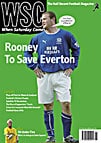 American soccer prodigy Freddy Adu has garnered much media coverage at a tender age, attracting interest from a host of European giants. His potential greatness as a player is commercially appealing for major brands, but will he fulfil his enormous potential? Neil Forsyth writes
American soccer prodigy Freddy Adu has garnered much media coverage at a tender age, attracting interest from a host of European giants. His potential greatness as a player is commercially appealing for major brands, but will he fulfil his enormous potential? Neil Forsyth writes
When 14-year-old American sports prodigy Freddy Adu signed his first professional deal in November, he was presented to the media in New York’s Madison Square Garden. That evening, he guested on The David Letterman Show as the US dailies went to press with his name emboldened in the sports pages. Six months earlier, Nike had tied him to a $1 million endorsement. America, the land of hype and hyperbole where sport and business entwine like lovers, is shaping its latest sporting icon. The surprise is Adu’s chosen sport, soccer.
It is primarily talent, of course, that has made Adu the Macaulay Culkin of football. Footage from international youth tournaments shows a graceful player of electrifying pace seemingly unaware of the ball and the opposition he glides by. At a tournament in Italy, Internazionale offered his parents £750,000 on the spot for his signature. Before he decided to sign a four-year deal with MLS outfit DC United, other suitors included PSV Eindhoven, Barcelona, Chelsea and, inevitably, Manchester United. Sir Alex Ferguson had moved during his team’s summer tour of the US to start a relationship with Adu and his family, no doubt encouraged by Freddy’s comments to the BBC. “I would love to end up in England some day, playing for Manchester United or a team like that. I have loved them since I was a baby.”
Adu’s infancy was spent far from both Old Trafford and America, his adopted home, and herein lies another clue to his soaring profile. Born in Ghana in 1989, for eight years the city of Tema was both his home and his future. Then, in 1997, came the life-defining news that the Adu family had won a US immigration lottery. Suddenly, eight-year-old Freddy found himself at school in Washington DC. Adu joined in a soccer game, something he knew as mass kick-abouts in Tema. His enthralled playground companions suggested he join a local team and he hasn’t looked back. Full US citizenship arrived earlier this year, a couple of months before Nike.
His story is perfect for modern America and, as a result, for Nike. His potential greatness as a player is commercially attractive to any brand but it is his iconic potential, as a black immigrant from a disadvantaged background, which reflects Nike’s “urban” image. “It’s LeBron James,” said DC United’s Santino Quarenta of his new colleague. “There’s going to be so much hype, so much pressure.” The shaping of 18-year-old James as basketball’s future has been influenced by two factors. His phenomenal ability and the headline-grabbing $90m endorsement he signed this year… with Nike.
But James is physically developed and ready for the highest level, his talent is guaranteed and endangered principally by injury. Adu is a developing player, a wonderkid but a kid all the same. If he takes to the field, he will be the youngest player for a major American team since a 14-year-old baseball player named Fred Chapman with Philadelphia in 1887. You won’t find Chapman in baseball’s Hall of Fame.
“There are young athletes in every sport that are highly regarded by the adults at early ages that never meet the expectations of the adults,” added US coach Bruce Arena, though glowing in assessment, when asked about Adu. “I think that everyone has to take a step back and realise that the next three to four years will be growing years,” was the response of national team captain Claudio Reyna.
Encouragingly, another calming voice comes from Adu himself. His goal remains the 2006 World Cup that starts exactly a week after his 17th birthday. “I like to think of myself as having a pretty good chance,” is how he evaluated his possible involvement. “Everyone is like, ‘Oh, could you have signed with European teams?’ I could have, but I decided not to because I have a long way to go and I want to mature and be at home for a little bit,” he added. Amid the brouhaha, Adu has at least kept a level head. Whether or not he will ever justify the attention is another matter.
From WSC 203 January 2004. What was happening this month